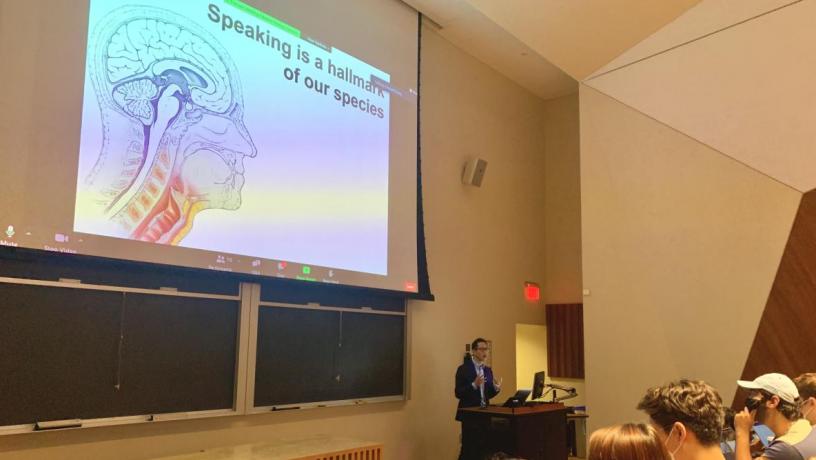Van C. Mow Lecture: Event Recap
BME SEMINAR SERIES

On Friday, September 17, 2021, a seminar hall in the Northwest Corner Building buzzed with excitement as students and faculty gathered in person for the first time in nearly two years for the start of the fall Columbia Biomedical Engineering Seminar Series. The distinguished Van C. Mow Lecture, named after the accomplished scholar and founding chair of the biomedical engineering department, marked the beginning of the annual weekly seminar series that highlights the latest developments and research in biomedical engineering.
Dr. Edward Chang, the Joan and Sanford Weill Chair and Jeanne Robertson Distinguished Professor of Neurological Surgery at the University of California, San Francisco, captivated the audience with his lecture titled “Restoring Words: Towards a Speech Neuroprosthesis”. Chang’s clinical expertise is surgical therapies for epilepsy, brain tumors, and cranial nerve disorders. He specializes in advanced neurophysiologic brain mapping methods, including awake speech and motor mapping, to safely perform neurosurgical procedures in eloquent areas of the brain. His work as a neurosurgeon informs his research, through which he investigates the functional organization of the human speech cortex toward the development of a speech neuroprosthetic device to restore communication for people living with paralysis.
Chang and his team discovered commonalities in the mapping of different vocal components’ control areas that exist across all human brains. These patterns often remain, even after a person experiences a form of paralysis related to communication known as “locked-in syndrome”, in which the person has intact cerebral function but the signals are blocked from getting to the rest of the body. Currently, most communication solutions are extremely slow compared to typical thinking and speaking speed. Chang hopes to restore speech, and therefore significantly improve quality of life, for these patients. Using an array of electrodes on the brain to get direct recordings, the neuroprosthesis decodes precise spatiotemporal codes into words, which Chang demonstrated to the audience in a video showing a patient responding to text prompts solely through the neuroprosthesis device. In the future, Chang hopes to improve both accuracy and speed of the decoding to match regular speaking patterns, as well as expand the neuroprosthesis to other languages.
Chang’s passion for his work and his patients was evident, and the audience reflected his enthusiasm in their questions during the Q&A portion of the lecture. His work is directly changing lives and the way we understand speech, both in the lab and on the operating table. As Prof. X. Edward Guo, current chair of the BME department at Columbia, said after the event, “this is science fiction becoming reality!”
You can read more about the Chang lab’s neuroprosthesis development here. Chang’s inspiring lecture set the tone as the first of many exciting talks to come in this seminar series hosted by the Department of Biomedical Engineering at Columbia University. If you are interested in attending virtually, the weekly series takes place on Friday mornings at 11:00 AM Eastern and includes a variety of renowned academics from top universities to talk about their specific research and experience.
Learn more and register for the seminar series!
